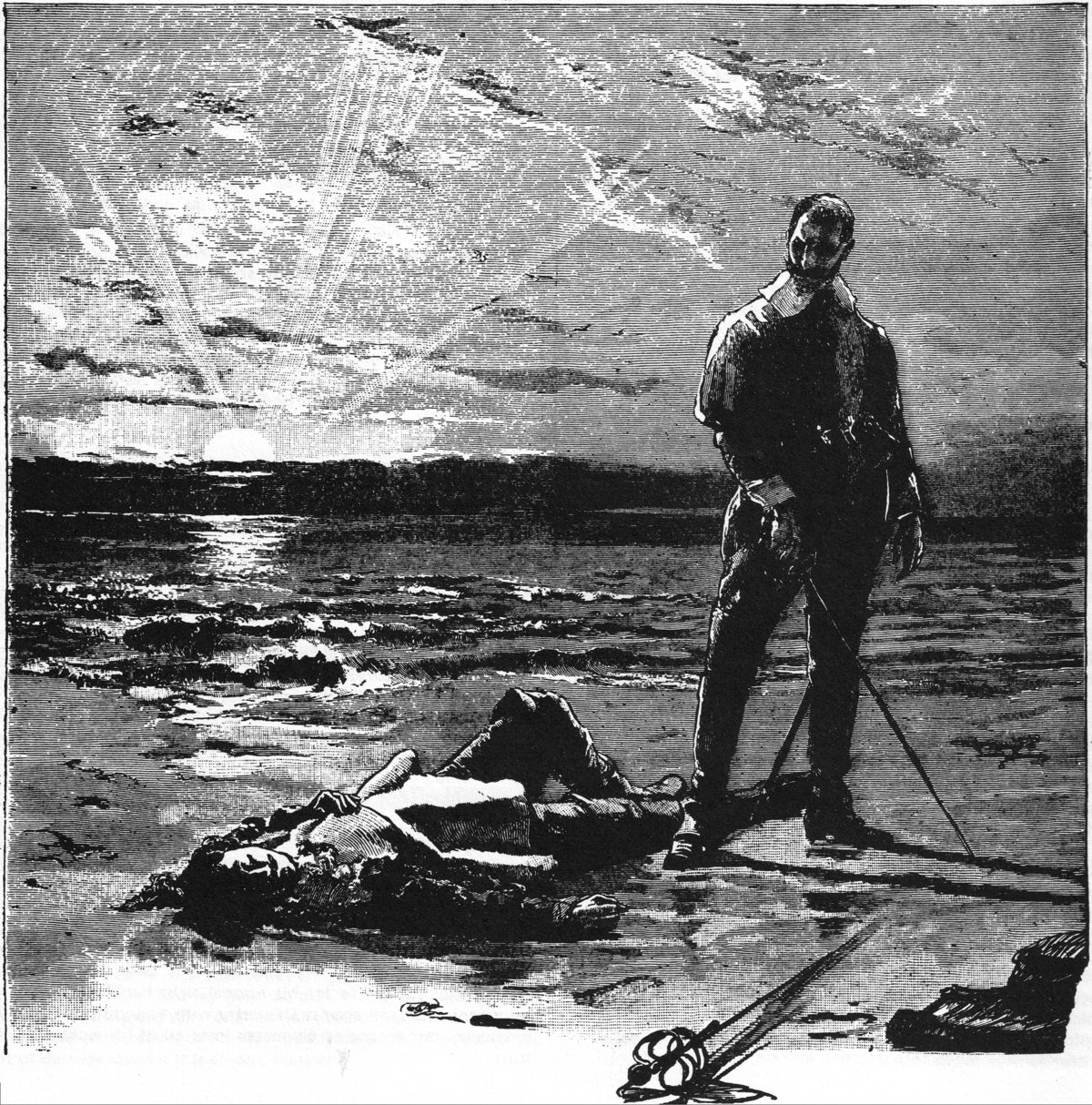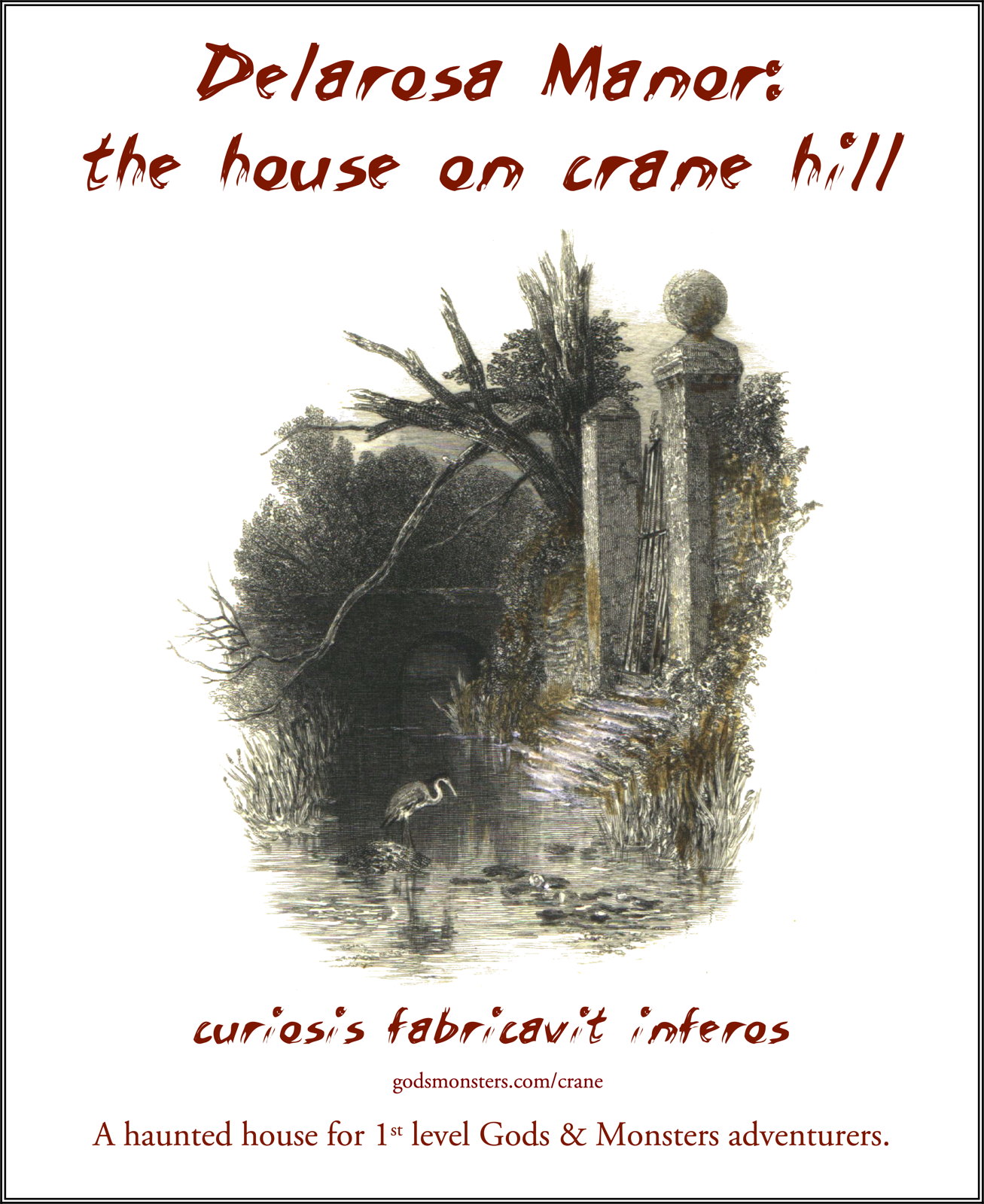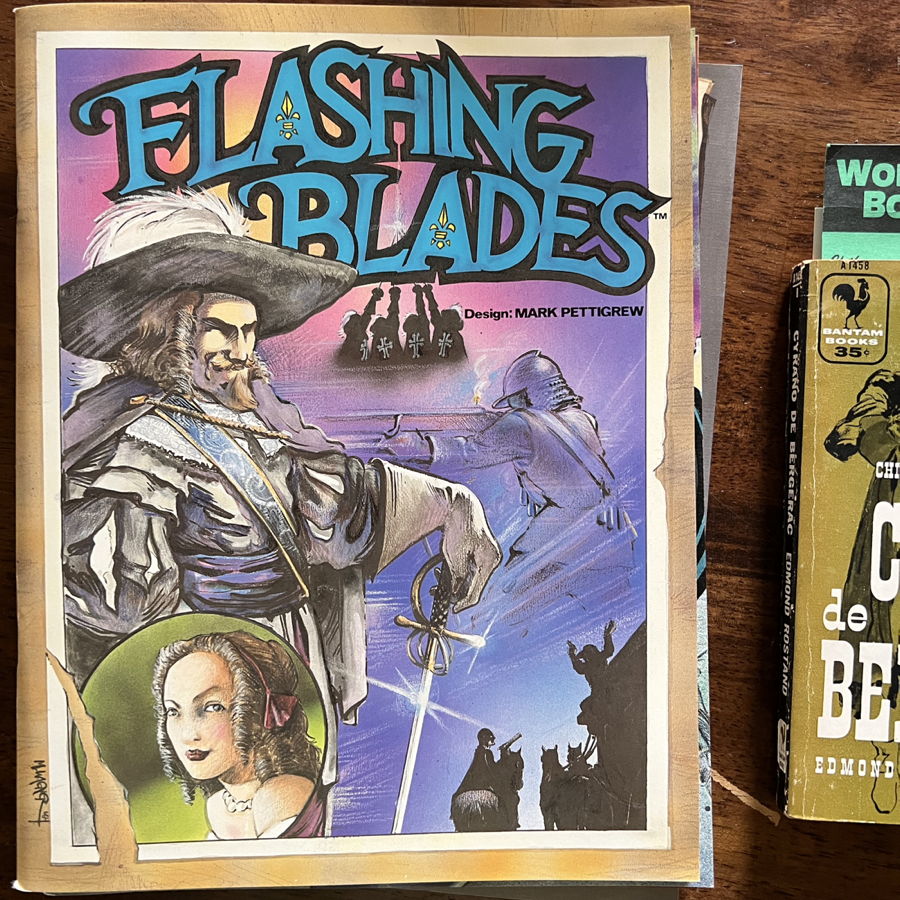-
 A Contrived Example of Game Play—Wednesday, February 11th, 2026
A Contrived Example of Game Play—Wednesday, February 11th, 2026
-
When you’re procrastinating in units of years, you can get a lot not done. — Paul Graham (How to Do Great Work)
I’ve started work again on making sure all of my Gods & Monsters game books are available in print. The first new release is my “contrived example of game play”, The Order of the Astronomers. It’s a “story” that follows four of the example characters in the rulebook as they adventure through the introductory adventure, The Lost Castle of the Astronomers. The characters I chose for the fictional players to play are Charlotte Kordé (monk), Gralen Noslen (sorceror), Sam Stevens (thief/warrior), and Will Stratford (warrior).
The point of this book is that the characters make choices like players make choices. The world responds like an Adventure Guide would respond. Footnotes throughout the story explain the rules in play during that encounter or for that action.
The Order of the Astronomers, like all of the books I want to make available in print, has long been available as a free downloadable PDF and as a web page. Unlike the other books, however, it isn’t a rulebook. It’s an example of how the rules work. I wanted to do it first because I wanted to go through it and make sure the notes about the rules were correct. It is a basic introduction to the game. I refer directly to it in the introductory adventure:
-
 Flashing Blades 2026: La Croisade Élevée at North Texas—Tuesday, January 6th, 2026
Flashing Blades 2026: La Croisade Élevée at North Texas—Tuesday, January 6th, 2026
-

I’ll be running two games at North Texas again this year. One will be a continuation of last year’s Mirror Universe Trek game using the Flashing Blades rules.
This will be the third year that I’ve run Flashing Blades at North Texas. This year’s game will be a continuation of last year’s, with the same pregens.
French Naval officers from 1705 cross blades with Mirror Universe Trek officers and crew on a disabled and strangely deserted Enterprise. Only the boldest can survive the highest of seas and… flashing blades!
I’ll be running Flashing Blades, most likely, on Wednesday evening. I’ll update this when the official schedule comes out.
The longer description remains the same as last year:
Half of you will play characters from a world where advancement is by assassination and wealth is gained through plunder. The other half will play 1705 Naval officers. The future of the Imperium is in your hands—next to your cutlass, dagger, and pistol. Choose from Mirror Universe Original Trek characters or French Naval officers.
As with last year, I’ll be playing fast and loose with the Trek side. I’m an original series fan and, to a lesser extent, an animated series fan. That means that pretty much everything about the Guardian of Forever I’ll have taken from The City on the Edge of Forever and Yesteryear. And pretty much everything about the Mirror Universe I’ll have taken from Mirror, Mirror.
I know there’s a lot of post-original series expansion of the Mirror Universe. I know nothing of it other than things picked up second or third hand from other fans. The Mirror Universe is the evil goateed reflection of the Federation universe. The characters from it are characters that have been immersed in that evil. Some have accepted it, some haven’t, but all have chosen to live with it—they are, after all, still alive.
Pregenerated characters will be available at the game.
-
 Kolchak 2026: Power of the Press at North Texas—Tuesday, January 6th, 2026
Kolchak 2026: Power of the Press at North Texas—Tuesday, January 6th, 2026
-

Kolchak will be back at the North Texas RPG Con in 2026!
I’ll be running two games at North Texas again this year. One will be my traditional Kolchak game, using the Daredevils rules . I’ll be running Kolchak, most likely, on Saturday morning. (I’ll update this when the official schedule comes out). It will take place exactly 49 years earlier:
Monday, June 6, 1977. Chicago in this blockbuster summer of Space Wars, Air Disasters, and Beer Chasers was beginning to resemble a Universal Movie lot. But if you’re tempted to think that these strange events were trivial compared to the bombs and riots of that hot Chicago weekend… resist the temptation. Because what happened in June of 1977 in downtown Chicago implicates the very foundation of the power of the press.
I’ve added three pregens to the roster of Carl Kolchak’s stringers. Kaz Kazantarkis (The Youth Killer) is a cab driver with a Ph.D. in the Classics, a very noir and a very Chicago character. Meredith Pollock (The Spanish Moss Murders) is a typically absent-minded professor who will someday become return to academia and may even become the president of a small Pacific university well into the future. The Monk (The Zombie) is a very mysterious homeless man with his hands on the pulse of the Chicago underworld.
Kolchak: The Night Stalker• is eminently rewatchable, and I strongly recommend that you take in a couple of episodes• whether you play this game or not!
This may be the last year that I run both Daredevils and Flashing Blades! at the same con. I’ve been going through my gamebooks culling the ones I’ll never run again for my yard sale pile, and there are a lot of games I not only want to keep but that I want to play. And since no one else is running them, the only way that will happen is if I run them.
I come to North Texas to play, not to run; so I don’t see myself running more than two games. Which means that if I want to run any of these other old-school games, I’ll probably end up alternating Daredevils and Flashing Blades!. They’re possibly my two favorite games outside of D&D, so I don’t want to drop them completely.
Hint: I’d love to play in a Daredevils! or Flashing Blades game that someone else runs.
-
 Adventure release: House on Crane Hill—Wednesday, October 29th, 2025
Adventure release: House on Crane Hill—Wednesday, October 29th, 2025
-

It says Gods & Monsters, but that means it’s easily playable in OD&D, BX, AD&D, and probably any D&D descendant. Also available in print.
Gods & Monsters isn’t really designed for convention games; it’s designed for multi-adventure campaigns. Much of its rules are about facilitating long-term play among friends. However, it is my favorite fantasy game to run, so when I decided to run my first game at North Texas many years ago, it was my first choice of rules. I designed House on Crane Hill to play into its strengths as a game where weird things can happen and players are encouraged to utilize old-school resourcefulness to respond to them1; and to minimize the game’s weaknesses when used for a one-shot game among strangers.
That’s also why I started the pregenerated characters with 500 experience points. It puts them just in range of advancing to second level during the game, if they use all or most of their mojo for archetypal rolls.
House on Crane Hill is heavily inspired by Shirley Jackson’s• The Haunting of Hill House• and the many movies and books inspired by it. That’s where the subtitle, “some houses are born evil” comes from, when Jackson’s anthropologist John Montague explains what he believes about what makes a house haunted.
“You will recall,” the doctor began, “the houses described in Leviticus as ‘leprous,’ tsaraas, or Homer’s phrase for the underworld: aidao domos, the house of Hades; I need not remind you, I think, that the concept of certain houses as unclean or forbidden—perhaps sacred—is as old as the mind of man. Certainly there are spots which inevitably attach to themselves and atmosphere of holiness and goodness; it might not then be too fanciful to say that some houses are born bad.
Montague then goes on to suggest that Hill House might be “disturbed, perhaps. Leprous. Sick.” That’s a pretty good description of Delarosa Manor in House on Crane Hill. The house was born disturbed.
-
 House on Crane Hill—Wednesday, October 29th, 2025
House on Crane Hill—Wednesday, October 29th, 2025
-
Some houses are born evil. Delarosa Manor is a mashup of Hill House, Phantasm, and similar books and movies. This is an adventure for first to second level characters, and designed specifically for convention use.
-
 L’Entreprenante l’Entreprenante: Mirror Universe Trek for Flashing Blades—Wednesday, September 10th, 2025
L’Entreprenante l’Entreprenante: Mirror Universe Trek for Flashing Blades—Wednesday, September 10th, 2025
-

This 1927 painting by Gordon Grant in the USS Constitution Museum depicts the USS Constitution. It’s very similar to what l’Entreprenante would look like.
I ran a second game of Flashing Blades at North Texas in June. It was a blast. The idea was that the crew of the mirror universe Star Trek from the Mirror, Mirror episode were stuck on a 1705 French warship (PDF File, 2.6 MB) until they could right the timeline to restore the Enterprise from whatever their own meddling in time had done to it.
Much as the Federation timeline crew had to do in City on the Edge of Forever. In fact, I incorporated that episode into the history of the Mirror Universe, but my fictional Mirror Universe crew had instead had to ensure peace activist Edith Keeler’s survival rather than her death.
I incorporated the High Seas supplement into the adventure, but I didn’t realize what that meant until I, fortunately, ran a test of the adventure with my local group. Given the backstabbing, power-hungry nature of the Mirror Universe crew I expected lots of sword fights, both between the Enterprise and l’Entreprenante crews and among the ambitious Enterprise crew.
In fact, the draw of this game was the ship combat. After running the first game locally, I added a simple ship-to-ship combat at the beginning of the game against a weaker ship as a likely possibility. This contrasts with a more dangerous ship-to-ship combat at the end of the game against a stronger ship. It also gives the players a handle on how ship combat works in Flashing Blades before the big fight at the end of the adventure.
This change also made the 18th century crew more active with respect to the 23rd century crew.
After the playtest I also modified one aspect of High Seas combat. High Seas provides five ship ranges: Far, Long, Medium, Short, and Close. This means that chases are over much too quickly. I added Too Far (which provides two ranges that are too far for firing cannon) as well as Medium Long and Medium Short. This gives more time for ship-to-ship volleys, especially where both ships are bearing down on each other.
-
 Plagiarism and copyright in RPGs—Wednesday, July 23rd, 2025
Plagiarism and copyright in RPGs—Wednesday, July 23rd, 2025
-
Plagiarism and copyright are two of the most misused terms in gaming. First, the differences. Plagiarism is about attribution. Copyright is about having a monopoly on copying and distributing. Copyright has nothing to do with attribution. If it would be against copyright law without attribution, it would be against copyright law with attribution. You can even plagiarize things that can't be copyrighted or that have returned to the public domain.
Plagiarism is not against the law. It’s just bad form in occupations where the source of ideas is often more important than the ideas themselves, mainly academia and politics. Not only is plagiarism not illegal, it’s not even generally bad form in freewheeling arenas where the focus is on the customer rather than the business. When Microsoft copies Apple, or Apple copies Google, or Frigidaire copies Whirlpool, or Steelcase copies Knoll, that’s not plagiarism. That’s getting better products to the customer.
In my opinion, the latter is where roleplaying games should fall as well. The gaming industry is fortunately still about better games for gamers, by gamers. It’s not publish-or-perish. It’s game-and-live. If there’s one lesson we can learn from the old-school, it’s that gaming rules. Publishing is secondary. Scholarship is tertiary. Gaming is the reason we’re gaming and the reason we’re writing games.
I’ve written before that you can’t copyright ideas, and that collections of ideas is mostly where roleplaying games fall. The notion that one company or other can legally restrict the spread of ideas—in the form of mechanics, or names, or even tables and lists—is a common misconception among gamers.
This question comes up a lot in various forms, although not usually in as obvious a manner as recently on theRPGSite where “What Precisely is plagiarism considered in the OSR?” was misconstrued into questions like “Is it okay to copy a mechanic wholesale?” and “When is it okay to borrow or use a mechanic and not list inspiration?”
To which the very first answer was “Number 1: a mechanic is not copyrightable.”
-
 Flashing Blades: Character Calculation Perl Script—Wednesday, July 9th, 2025
Flashing Blades: Character Calculation Perl Script—Wednesday, July 9th, 2025
-
I ran Flashing Blades again this year at North Texas, and it required making a bunch of custom character sheets. There are a handful of calculations that are the same calculation for every Flashing Blades character: hit points, encumbrance, and initial skill points. There’s also the combat modifier, which may or may not be different for firearms and crossbows. And characters that have the right combination of Strategy skill and rank have a chance for Brilliant Maneuvers.
Once you start making skill choices Flashing Blades is difficult to program for, but it is very helpful to get those five calculations done automatically to avoid typos. While none of those calculations are difficult, it’s always easy to skip a line on a table or misread a column when doing multiple characters in succession.
I’ve designed the script to use a text file of attributes, using a simple Markdown headline to title each character. Just point the script to that file—or multiple files—and either get all of the characters or just ones that match a search term. Here’s an example of some characters I’ll be using:
- # Captain J. Tiberius Kirk
- Strength: 12
- Dexterity: 10
- Endurance: 14
- Wit: 13
- Charm: 15
- Luck: 12
- # Chief Science Officer Spock
- Strength: 16
- Dexterity: 15
- Endurance: 15
- Wit: 17
- Charm: 8
- Luck: 9
If I type
~/bin/flashing Characters/Enterprise.txt KirkI get:- # Captain J. Tiberius Kirk
- Strength: 12
- Dexterity: 10
- Endurance: 14
- Wit: 13
- Charm: 15
- Luck: 12
- Encumbrance: 12
- Hit points: 13
- Skill points: 11
- Martial adjustment: 1
- Brilliant Maneuver (requires Strategy): 5




